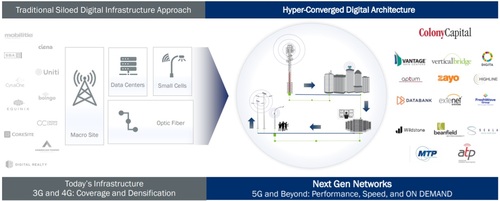After a year of shopping itself, Boingo has finally found a buyer.
However, the important element here is not that Boingo finally managed to sell itself, but that Marc Ganzi found another telecom company to purchase.
Boingo announced Monday that Digital Colony – a $23 billion infrastructure investment company linked to Ganzi's Colony Capital investment firm – will take Boingo private in a transaction valued at around $854 million. The figure represents a 23% premium to Boingo's recent stock price. The companies expect the deal to close in the second quarter of 2021.
Boingo has long been a small but noteworthy player in the US telecom industry. Although the company initially made a name for itself selling Wi-Fi access to consumers in public venues – indeed, the company's stock ticker symbol is "WIFI" – much of Boingo's business has since shifted away from the retail market. The bulk of Boingo's revenues today stem from building and operating Wi-Fi and cellular networks inside military bases, airports, apartment complexes and other large venues. (Boingo also announced another Wi-Fi offloading agreement with a "Tier 1" mobile network operator in conjunction with the release of its quarterly earnings Monday, but did not name the operator.)
Now, though, Boingo will sit inside the massive "digital infrastructure" business created by Ganzi.
Building networks
Ganzi founded Global Tower Partners (GTP) in 2003 and grew the business into the largest privately owned cell tower company in the US before selling it to tower giant American Tower in 2013 for $4.8 billion.
Then Ganzi founded Digital Bridge, his first step toward network infrastructure convergence. Via a series of complex financial transactions over the past decade involving Digital Bridge, Digital Colony and Colony Capital, Ganzi has assembled a global portfolio of telecom companies that now include the largest private tower company in the US, Vertical Bridge, as well as the largest private small cell company in the US (ExteNet Systems), two data center companies (DataBank and Vantage Data Centers) and tower operations in countries ranging from the UK to Mexico to Peru. Just last year, Ganzi orchestrated the $14.3 billion acquisition of fiber giant Zayo.

Colony Capital counts a wide variety of companies in its portfolio. Click here for a larger version of this image.
(Source: Colony Capital) On Monday, Ganzi added Boingo to the $30 billion worth of telecom assets under the management of his real estate investment trust (REIT).
"The game has changed," Ganzi said Monday during an appearance at an investor event. "This is all changing, and it's changing very rapidly."
The future network
Ganzi argued that the telecom networks of the future will not use discrete elements like cell towers and fiber, as they have in the past. Instead, he said, such operations would leverage virtualized core networks operating across a mix of macro cell towers, small cells, fiber networks, data centers and edge computing operations.
"All of that needs to work in a harmonious way," he argued.

Colony Capital sees convergence among a variety of telecom infrastructure elements. Click here for a larger version of this image.
(Source: Colony Capital) Others agree.
"We think that all goes together," said Ray LaChance, CEO of Zenfi Networks, during the recent Metro Connect USA trade show. LaChance specifically pointed to Ganzi's Colony Capital as an example of the telecom landscape of the future. He said Zenfi too is working toward that future by combining telecom elements, including small cells and fiber, to support a range of customers, including mobile network operators, enterprises, wireless Internet service providers, cable companies and others.
The network, LaChance said, is converging.
Some financial analysts are buying into Ganzi's world view.
"Over time, we expect overlapping demand driven by 5G/edge/cloud to result in increasing synergistic value among towers, data centers, optical fiber and small cells/DAS [distributed antenna systems] that likely will result in the creation of large infrastructure conglomerates of sorts that provide most if not all communication infrastructure services," wrote the financial analysts at Cowen in a recent note to investors about Colony Capital.
The Cowen analysts pointed to a number of examples of this convergence, including Crown Castle's fiber purchases and SBA's data center acquisitions.
So what is Ganzi's next step?
"Where we're going is an earnings-based model now," he explained Monday. "You now have consistent earnings, you now have a fundamental base of assets, you have a fundamental base of investment management fees. It really is an elegant mousetrap for investors."